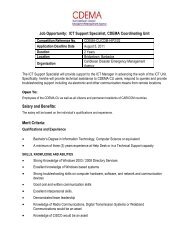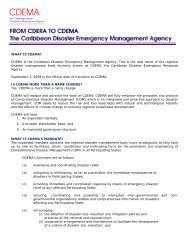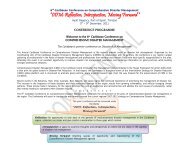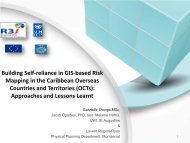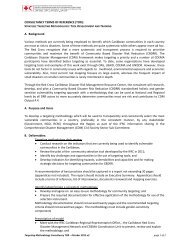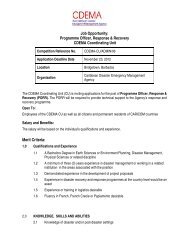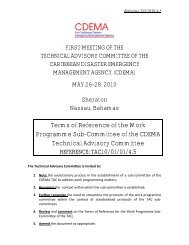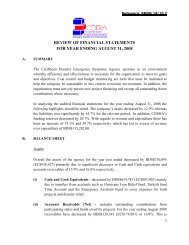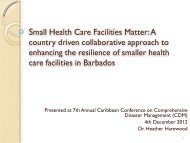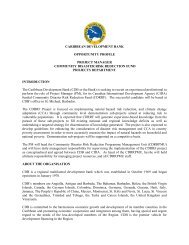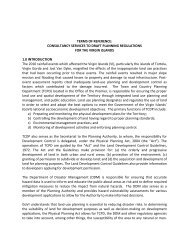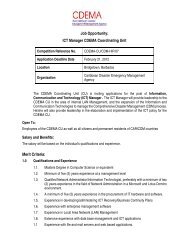You also want an ePaper? Increase the reach of your titles
YUMPU automatically turns print PDFs into web optimized ePapers that Google loves.
Each unit is divided into shorter sessions to retain the interest of participants and each session uses one or<br />
more teaching methodology.<br />
The Module will also incorporate a welcome and introduction session and a basic initial assessment of the<br />
entering knowledge and attitudes of participants.<br />
3.4.4.6 Process for developing the Module<br />
The development of the Module will be done in a participatory manner and will again be implemented using a<br />
phased approach, to include:<br />
a) Submission on 9 August 2010 of a Module outline for review and approval in principle by <strong>CDEMA</strong>;<br />
b) first draft submitted for review by <strong>CDEMA</strong> and the CSSSC, to incorporate any feedback from the 13<br />
July PSC meeting and in accordance with the timeline at Section 6 and Appendix 3);<br />
c) revised Module, based on comments received from <strong>CDEMA</strong> and the CSSSC, within two weeks of<br />
receipt of comments;<br />
d) testing of Module at two community workshops and the Training of Trainers workshop;<br />
e) final revision of Module, based on feedback at the workshops, including that of <strong>CDEMA</strong>, PSC or<br />
CSSSC members who attend the workshops, within two weeks of receipt of comments.<br />
3.3.5. Development of Trainer’s and Participant’s Handbooks<br />
3.3.5.1 Overview<br />
The Module will accompanied by two Handbooks:<br />
a) the Trainer’s Handbook, designed for use by facilitators and to include an overview of learning<br />
objectives and anticipated results, session plans, materials (including PowerPoint presentations, case<br />
studies and other resource materials); and evaluation instruments;<br />
b) the Participant’s Handbook, designed for use primarily by participants at facilitated workshops but also<br />
containing additional materials and resource lists that they can use after the workshop to extend their<br />
understanding of the issues and possible responses in building community resilience and adapting to<br />
climate change.<br />
As with the Module, the language used in the Handbooks will be simple and not assume prior scientific<br />
knowledge.<br />
3.3.5.2 Target audience<br />
As noted above, the Trainer’s Handbook is primarily for use by community facilitators and animators who are<br />
working with community groups to develop disaster risk reduction plans. It can also be used as a complement<br />
to a community development planning process to ensure that the plans are climate proofed. The Module is<br />
intended for use by persons with some experience in facilitation and workshop design and delivery at the<br />
community level.<br />
The Participant’s Handbook is intended to be used by participants attending workshops based on the Module,<br />
both during the workshop and a resource afterwards. Although the language and approaches used will be<br />
appropriate to a community level and to different styles of learning, basic functional literacy will be necessary<br />
for participants to gain full benefit from the tools, methods and resources in the Participant’s Handbook.<br />
3.3.5.3 Process of development of the Handbooks<br />
To ensure consistency of the pedagogical approach, and in view of the restricted timeframe for the<br />
consultancy, the Handbooks will be developed in tandem with the Module, rather than sequentially. They will<br />
be developed in a participatory manner and will again be implemented using a phased approach, to include:<br />
12



